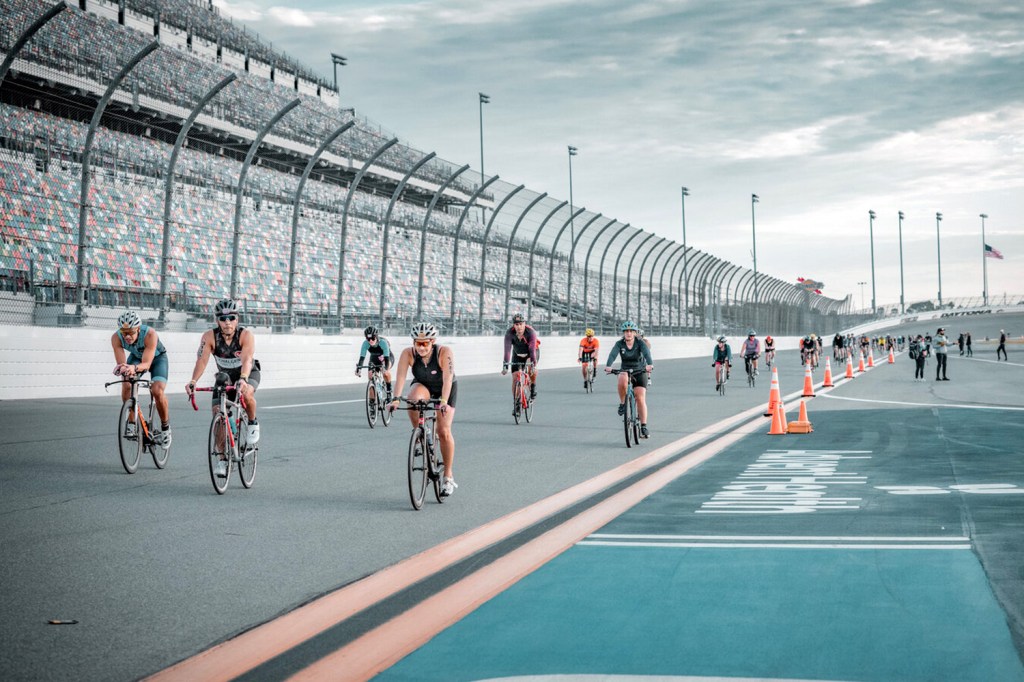I wasn’t ready for the humidity in Florida. The air outside of Miami International Airport damn near suffocated me and I’d already broken a sweat by the time I hopped in a cab to Homestead.
The aptly titled Homestead-Miami Speedway where I was dropped off was built for about $70 million in the mid-1990s — an effort to help the area recover after being devastated by Hurricane Andrew. The track began hosting NASCAR races in 1995 and still does to this day, most notably the Dixie Vodka 400, which will take place there this October.
But on this sweltering weekend in March, the speedway is the site of a rapidly growing triathlon festival known as Clash Endurance. The business was rebranded from Challenge North America in summer 2021 and has four events planned for 2022:
- Clash Miami, the one I’m competing in, obviously
- Clash Watkins Glen (a village in New York’s Finger Lakes region) in July
- Clash Atlanta in November
- Clash Daytona in December
Like the Miami event, every single one of these is held at a well known race track.
Watkins Glen International, affectionately known as “The Glen,” famously hosted the Formula One United States Grand Prix from 1961 to 1980 and is currently home to NASCAR Cup Series and Xfinity Series races. Road Atlanta has IMSA and MotoAmerica races. Daytona International Speedway is, of course, the site of America’s most popular motorsports race, the Daytona 500.
The professional tier at this year’s Miami competition had a $50,000 prize purse, and pros battled it out for a piece of a $100,000 purse at Daytona last December.
The field has athletes from all over the world. In the transition area — where they switch from swimming to biking, or biking to running — I see flags from the United Kingdom, Puerto Rico, Germany, Australia, Argentina, and Brazil, to name a few.
On my first night in town, I was only at Homestead-Miami to get registered and pick up my race bib. I’d be back to test my endurance alongside two of the world’s best triathletes in 12 hours.
Swim, Bike, Run
I might hit the treadmill on a regular basis, but I’m in no shape to handle an entire triathlon by myself, and certainly not at the middle distance tier — 1 mile swim, 56 mile bike, 13.1 mile run. Nope, I’ll be competing at sprint distance, and as part of a relay team rather than individually.
Clash officials set me up with some stars, too.
- Brent McMahon is a two-time Canadian Olympian and four-time Ironman champion. He’ll swim half a mile in a spring-fed lake inside the venue to kick things off.
- Andrew Starykowicz will handle the 12.4 mile bike ride, which is light work for him. He holds the Ironman world record for fastest ever bike split time and has won multiple Ironman competitions as well. I saw a couple of fans come up and ask him for selfies.
Then there’s me, running 3.1 miles, on the verge of passing out under the Florida sun without that Precor from my local gym in Los Angeles propelling me forward. The hot concrete of a speedway is a different story. That said, the seasoned triathletes are extremely encouraging with their pats on the back and choruses of “you can do it” as they lap me up.
These events are big business. Entry fees vary by location, but depending on the format, you can get in for anywhere from roughly $30 to $300. That starts to add up when you consider that more than 1,000 athletes showed up to the Homestead-Miami track this weekend.
Sponsorship revenue from partners like Toyota and Morgan Stanley is also a factor, as well as income from media rights agreements with broadcasters like NBC and Fox Sports 1.
Ironman, one of Clash’s competitors and arguably the most recognizable brand in triathlons, provides a solid example of the space’s earning potential.
The company — which hosts its Ironman 70.3 North American championships in Chattanooga this Sunday — brought in $91.9 million in revenue in 2019, according to an IPO filing by then-owner Wanda Sports Group. Ironman was subsequently sold to Condé Nast owner Advance Publications for $730 million in August 2020.
One Venue to Rule Them All
“From a revenue standpoint, we did very well last year. We’re reinvesting aggressively. I personally will have our company in the market raising funds, probably in the middle to late part of the summer,” Clash Endurance CEO Bill Christy told me after the race. “You know my background, I’ve done that successfully in the past. And that will really allow me to scale quicker than if we did it organically.”
- Christy has founded or led several medical device companies throughout his career where venture capital raises were essential to operations.
- He would take vacations around the country to compete in different triathlons, which is when he saw the opportunity for a new approach.
“There are 2.3 million triathletes in the United States…from a business standpoint, we’re really our market size,” he said, as I shoved down Gatorade and bananas, doing my best to keep my Jell-O legs from cramping up.
Clash’s motorsports connection makes more sense when you realize that Christy is married to Lesa France Kennedy, executive vice chair of NASCAR, CEO of International Speedway Corp. (which NASCAR bought for $2 billion in May 2019), and granddaughter of late NASCAR founder Bill France Sr. Clash events even let civilian passengers do hot laps around the race track in a stock car for $50.
Christy believes putting on triathlons at a contained location is Clash’s key differentiator in an increasingly crowded space, where there is not only the aforementioned Ironman, but Escape From Alcatraz, Challenge Roth, and dozens of other competitions.
Hosting everything within one venue is conducive to the family-friendly atmosphere he’s trying to build at Clash, where spectators can grab lunch at a food truck, music is blasting over the PA system, and supporters can watch their loved ones’ entire trek with ease. The Watkins Glen course’s finish line is literally at the Finger Lakes Wine Festival.
“This business is gonna get big, and it’s gonna get big fast,” Christy said, wrapping up our conversation. “As long as I’m having a good time, I’m here. As you can tell, I’m not doing this because it’s a business, I’m doing it because it’s a passion. But it’s also got to be a business.”



